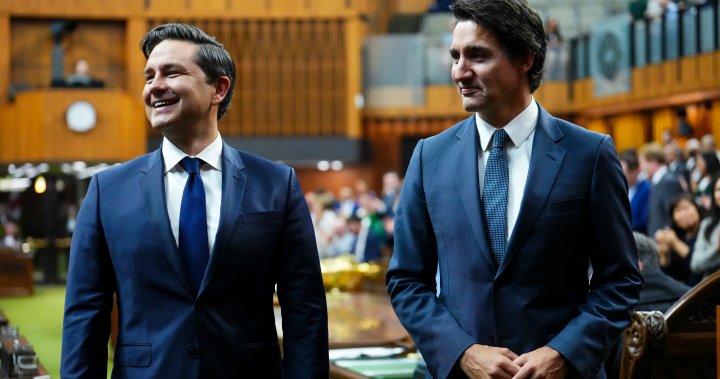Shifting Sands in Canadian Politics: A Deep Dive into the Latest Ipsos Poll
The Canadian political landscape is experiencing a period of significant flux, as revealed by a recent Ipsos poll conducted for Global News. The poll, released in December 2024, paints a picture of declining Liberal support, a resurgent NDP, a consistently strong Conservative showing, and a populace grappling with the implications of a potential Donald Trump presidency in the United States. The poll also highlights a growing dissatisfaction with Prime Minister Justin Trudeau’s leadership and a preference for stability over a snap election.
The most striking revelation of the Ipsos poll is the five-point drop in Liberal support since September, down to 21%, effectively tying them with the NDP, which saw a corresponding five-point surge. This shift suggests a potential realignment within the progressive voter base, with some traditional Liberal voters appearing to migrate towards the NDP. This dynamic of "Liberal-NDP switchers" has become a significant force in Canadian politics, and the current poll underscores its potential to reshape the electoral landscape. While the Conservatives remained relatively stable, experiencing a negligible one-point dip to 44% support, their substantial lead over both the Liberals and the NDP positions them as a dominant force in the current political climate.
Further compounding the Liberals’ woes is the declining popularity of Prime Minister Trudeau. The poll indicates a five-point drop in his approval rating, with only 23% of respondents believing he deserves re-election. A significant 77% expressed a desire for a change in government, signifying widespread dissatisfaction with the current Liberal administration. This decline in Trudeau’s popularity coincides with the Liberals’ unsuccessful attempts to leverage the potential return of Donald Trump to the US presidency to their advantage. Pre-poll speculation suggested that Trudeau could position himself as a progressive counterpoint to Trump, thereby bolstering his and the Liberal Party’s image. However, the poll data refutes this hypothesis, indicating that the anticipated "Trump bump" failed to materialize.
Adding another layer of complexity to the political narrative is the public perception of how different Canadian leaders would handle a potential Trump administration. Surprisingly, Conservative leader Pierre Poilievre emerges as the preferred choice to navigate this delicate diplomatic landscape. The poll shows 34% of respondents favoring Poilievre for this role, compared to just 22% for Trudeau. This finding suggests a potential disconnect between the Liberals’ perceived progressive stance and the public’s assessment of who would be most effective in dealing with a potentially volatile Trump presidency. It also underscores Poilievre’s growing influence and the public’s apparent confidence in his ability to manage complex international relations.
The Ipsos poll also reveals a prevailing sentiment among Canadians against triggering an early election. Despite the Liberal government’s declining popularity, 54% of respondents believe opposition parties should adopt a collaborative approach, working with the government on a case-by-case basis to avoid a snap election. This preference for stability over political upheaval suggests a cautious public mood, possibly stemming from concerns about economic uncertainty or the potential ramifications of a Trump presidency. Only 46% of respondents favored an early election, indicating a clear majority preference for maintaining the current political course, at least for the time being.
The poll results offer a snapshot of a dynamic and evolving political landscape. The Liberals face a significant challenge in regaining public trust and reversing their declining popularity. The NDP’s surge in support, fueled by potential disillusionment with the Liberals, positions them as a key player in the progressive space. Meanwhile, the Conservatives maintain a comfortable lead, benefiting from the Liberals’ struggles and the public’s apparent confidence in Poilievre’s leadership, particularly in the context of a potential Trump return. The poll also highlights the public’s desire for stability and a collaborative approach to governance, despite the underlying tensions and shifting allegiances.
The Ipsos poll’s findings are based on a survey of 1,001 Canadians aged 18 and older, conducted online between December 6 and 10, 2024. The poll has a margin of error of ± 3.8 percentage points, 19 times out of 20. While these numbers provide a valuable insight into the current political climate, it’s crucial to remember that public opinion is fluid and can shift rapidly in response to events and political developments. The coming months will undoubtedly be crucial in determining whether these trends solidify or give way to new political realities. The interplay between the Liberal decline, the NDP’s rise, the Conservatives’ consistent strength, and the looming shadow of a potential Trump presidency will continue to shape the Canadian political narrative in the foreseeable future.

